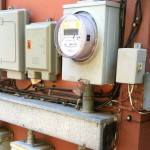Texas Wind Power Considers Future Of Fewer Tax Breaks

Mose Buchele/StateImpact
Wind turbines in West Texas help produce record amounts of electricity for the state.
The federal tax credit that helped make Texas the leader in wind power expires at the end of year. Some people in the wind energy industry seem resigned to the possibility that even if Congress renews the credit, the days of such breaks are nearing an end.
At the American Wind Energy Association conference held last week in Houston, there was optimism that President Obama’s reelection improved the odds that Congress will extend the production tax credit.
“But few believe the production tax credit will be in existence in 2015,” said Steve Krebs, the vice president of OwnEnergy, who was part of a panel discussion.
‘A Tipping Point’
The chair of the conference was Jimmy Glotfelty, co-founder of Clean Line Energy, a Houston company that develops transmission lines for wind-produced electricity.
“We recognize there is a tipping point where we stand on our own and be good Americans and try to be part of the solution on the debt and deficit problem,” said Glotfelty.

Dave Fehling/StateImpact
Wind industry executive Jimmy Glotfelty says tax incentives are needed for a few more years.
In an interview with StateImpact Texas, Glotfelty acknowledged that government incentives won’t last forever, but said they’re still needed at least for five more years to foster development of wind projects. With the uncertainty over the federal tax credit, such projects have nearly stopped. Some companies in Texas are cutting back their workforce.
Don’t expect much sympathy from opponents of government subsidies for wind.
Subsidies ‘Undermining Profitability’
“They’re undermining the profitability of the entire sector,” said Josiah Neeley in an interview with StateImpact Texas. Neeley is with the conservative Texas Public Policy Foundation in Austin. The foundation opposes an extension of the federal tax credit and also thinks the state’s Renewable Energy Credits program should be reconsidered. Neeley said the government subsidies will cost Texas and the federal government some $12.9 billion over a ten year period.
Neeley, as well as the chairman of the Texas Public Utility Commission (PUC), Donna Nelson, argue that the subsidies are making wind electricity so cheap that they’re artificially driving down electricity prices overall in Texas, thus lowering profits for traditional power made with natural gas or coal. Lower profits could mean there’d be less incentive to build more generating capacity in a state that the PUC has said will desperately need more electricity in coming years.
“If the wind industry can’t survive without government support at this point, I don’t see any reason they’ll be able to do so in the future,” Neeley told StateImpact.
The wind industry counters that it’s not like it’s alone in receiving government help.
“The coal industry, the oil and gas industry, the nuclear industry; they all have their own tax breaks,” said Jimmy Glotfelty.
